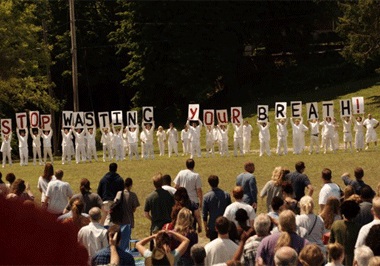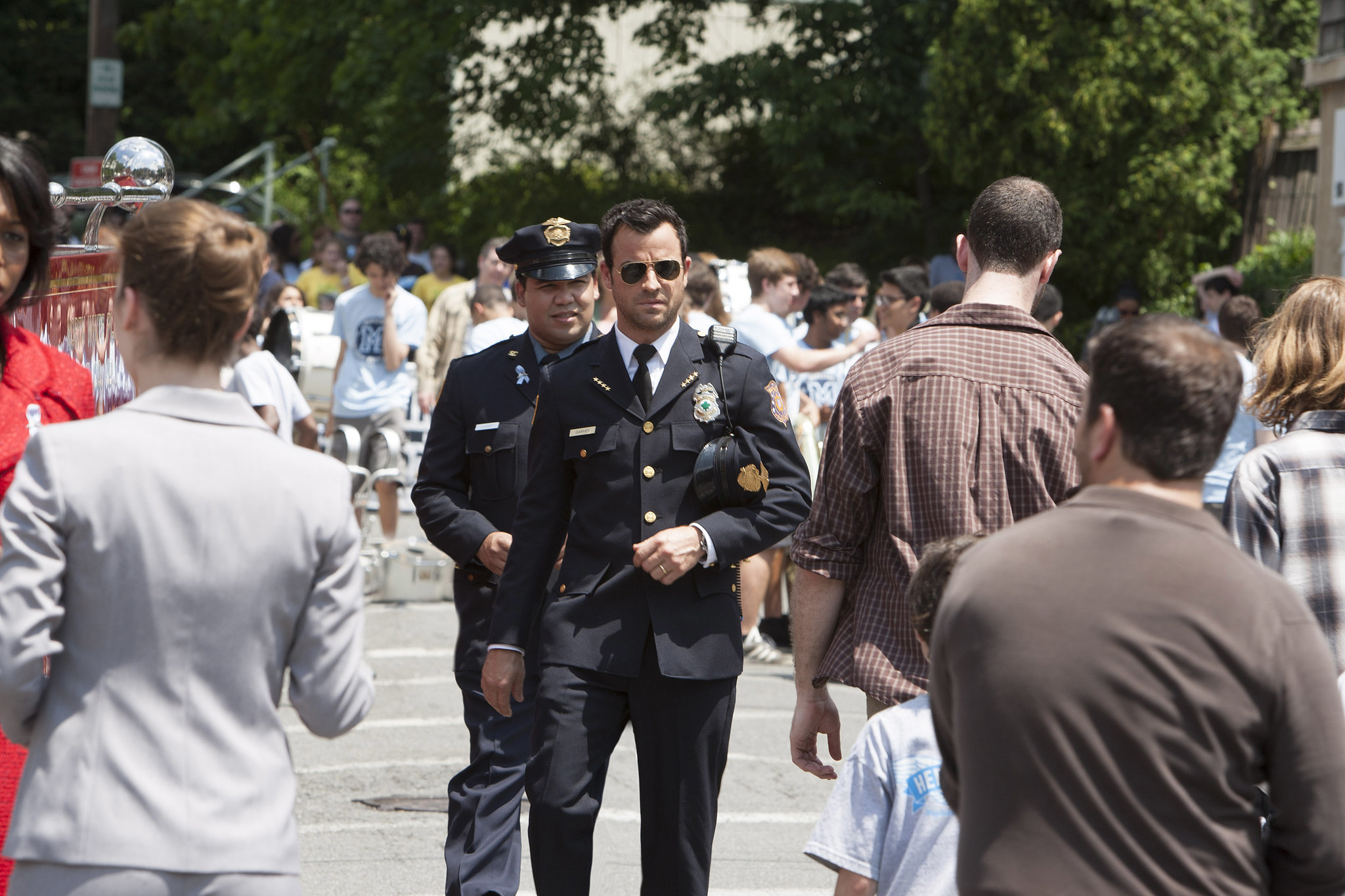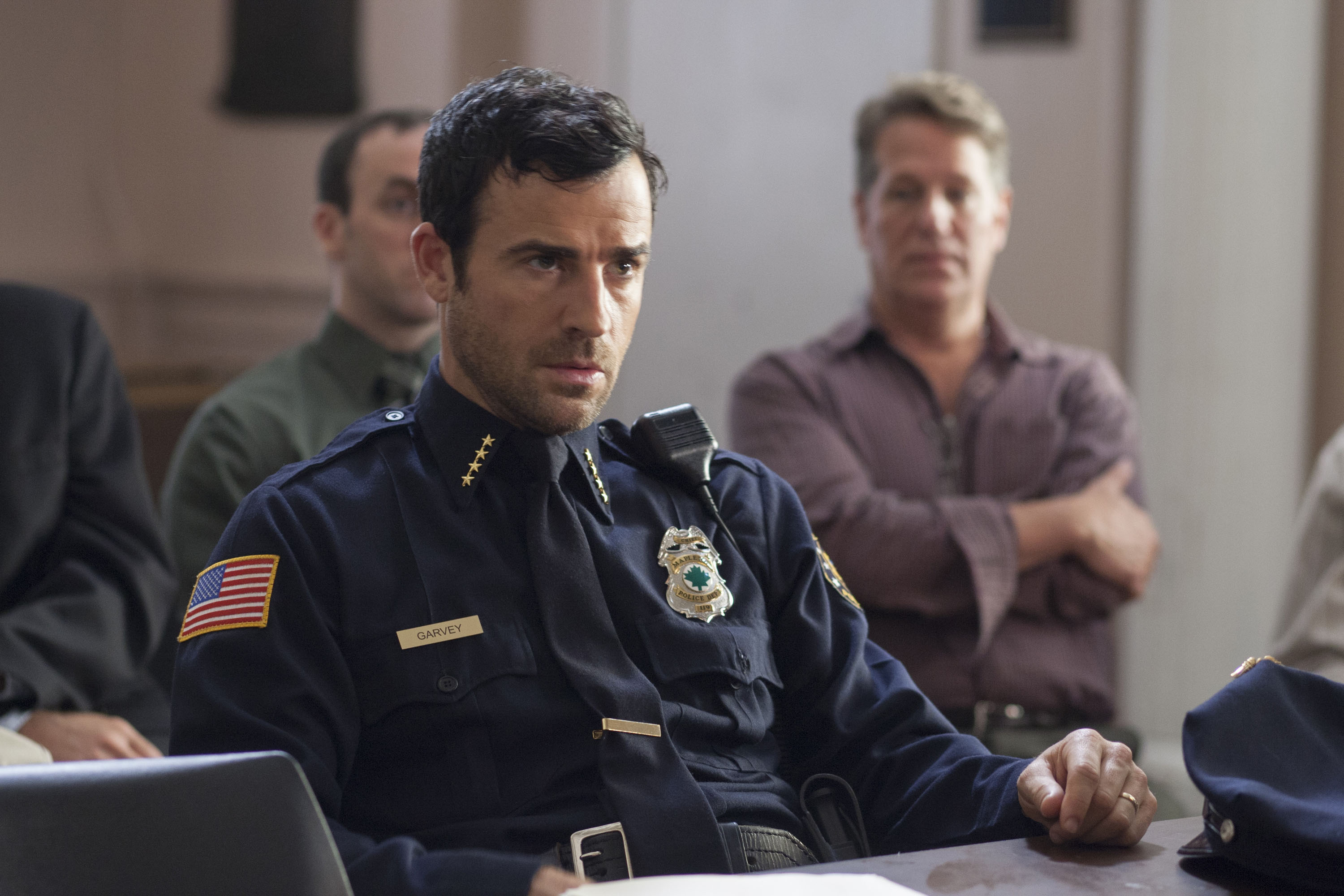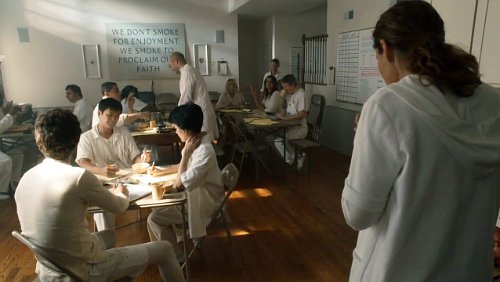Note: As with all TV recaps, there may be some mild spoilers below for those who did not watch the episode. If you're only looking for a content advisory, skip to the end.
Whereof one cannot speak, thereof one must be silent.
(Ludwig Wittgenstein, Tractatus Logicus-Philosophicus, Proposition 7)
Last summer I wrote about how the end of the world had come to the movies. Lo and behold: like a thief in the night, The Leftovers premiered on HBO yesterday. The apocalypse has arrived on TV.
Or has it? That's the thing about The Leftovers: this is not a "rapture" you'll recognize (and despite the similarities in the names, it's certainly not the Rapture we'll see Nic Cage emote about onscreen later this year with the Left Behind reboot).

I've seen some writing about the show which proposes that this show's Rapture, which flouts the more common one, exemplifies our secular society. There might be something to that, but I think it's too simple of a reading. The Leftovers needs to be watched as a show about something else—something that doesn't tell a story drawn from religious narratives, but touches very deeply at the heart of far more religious questions.
Tom Perrotta, who wrote the novel on which the show is based, joined forces with Lost creator Damon Lindelof to write this show. (Perrotta also penned the novels that formed the basis for Election and Little Children.) The premise is simple and familiar: three years ago, on October 14, about two percent of the world's population simply disappeared. Poof. Gone.
That disappearance would have most easily been explained as the Rapture, as outlined by some Christian denominations' interpretations of the Bible, in which the faithful are suddenly called away from the earth, leaving behind those who will now suffer through the Tribulation before Christ's return. And some in this world tried to explain it that way. But these disappearances are far more difficult to explain, with no logic underneath. Religious and faithful people are taken, or left. But irreligious are, too. Bad people disappear. Faithful remain. Some children disappear, but others remain without their parents.
If the Rapture in popular imagination comes with a "bang" (see the Left Behind trailer), this one is a whimper. They were there. And now they are not.

This all happens in the first few minutes of the pilot episode, and afterward, we jump ahead three years. The families are left grieving and everyone wants answers, but nobody can provide them. And so a number of cults have sprung up: there's the free-love hippies, of course, who will eat and drink and make merry till they die. Then there's a personality cult led by a man named Holy Wayne (Paterson Joseph), whose only distinguishing characteristic at present is his ability to quote the Bible and attract nubile young Asian women to his harem.
And there is a creepy shadowy cult called the "Guilty Remnant," who dress all in white, live in a commune, eat only for sustenance, take a vow of silence, and smoke many packs of cigarettes a day—to "proclaim" their faith, as a poster in their house reminds them.
The show centers on the suburban town of Mapleton, and specifically the Garvey family: Kevin (Justin Theroux), Mapleton's chief of police; his wife Laurie (Amy Brenneman); their son Tom (Chris Zylka), who's joined the Holy Wayne cult; and their daughter Jill (Margaret Qualley), who's now a burned-out high school stoner with an anger problem and a promiscuous but sweet best friend (Emily Meade).
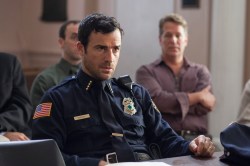
The Guilty Remnant (or "GR," as everyone calls them) popped up within the last year, and now there are about fifty of them. They stalk everyone in the town, mostly people who are trying to get on with their lives, like Meg (Liv Tyler), who is planning a wedding but seems about to fall to pieces. When the GR stalks you, there's no violence: they just stand there, in pairs, smoking, silently watching you. "We Are Living Reminders," the poster in their bathroom reminds them.
The overarching feeling in the town is not guilt, exactly—nobody really knows whether they should feel survivor's guilt, or sinner's guilt. Without knowing if they're the lucky ones or the damned, they're stuck. The mayor wants to hold a "Remembrance Day" so that everyone can feel better and remember their "heroes"; Kevin fires back that the only reason they're calling it that is because they can't call it "we don't know what the f*** happened day."
But the GR is just as confusing; they won't speak to anyone, and are increasingly driving everyone mad. "Where did they come from?" asks Kevin, desperation and fury in his voice. "What do they want?" Meanwhile, Holy Wayne is quite clear about what he thinks is happening: the three years' grace period is up, and now it's time to get to work, he tells Tom. (Those who've read the novel have a sense of what's coming next, but it's still ghoulishly, terrifyingly chilling.)
This whole pilot is well-directed and wound tight, ready to pop—"Nobody's ready to feel better. They're ready to f***ing explode," as Kevin puts it—such that it's a relief when the guns start to go off at the end of the episode.

So The Leftovers is about people dealing with the fallout of an inexplicable tragedy. But to say that out loud is to hint at what really lies at the heart of this show. The choice of a "Rapture" is merely a plot placeholder. It's a sort of science-fiction choice that stands in for something more real, something that haunts us nearly every day: how do we cope when bad things happen for no reason? What do we do when despite our best efforts, our most sincerely held beliefs, we can't figure out why God, or the Universe, or whatever seems to have done things that defy goodness and logic?
Locked into the center of the episode is a quote from Ludwig Wittgenstein, the German philosopher. At the end of his seminal Tractatus Logicus-Philosophicus, Wittgenstein—having spent the whole book trying to identify the relationship between language and reality—finally ends with a single aphorism before he falls silent: "Whereof one cannot speak, thereof one must be silent."
That quotation quietly surfaces in the middle of the episode, in the middle of other voiceovers, a cacophany of commentary mostly mediated through the radio and TV. That constant chatter that tries to make sense of tragedy can only happen in a world like ours, with a 24-7 void that needs to be filled with media commentary, with talk, with endless voices.
To turn on the television today after any confusing tragedy—say, a senseless school shooting or a hurricane or a terrorist attack—is to be driven almost mad by the constant hashing and rehashing of theories and "what we know" and angles and commentary, commentary, commentary. (One can hardly imagine that emotional moment of silence in Walter Cronkite's broadcast after the assassination of John F. Kennedy ever happening again.)

The thing is this: some things just don't make sense. Senseless tragedy is just that: it doesn't make sense. Language can't explain all of reality. Our poorly-timed attempts to make it do so, to fill the silent void, can cause us more grief.
The show makes much of this, contrasting the disembodied chatter of the TV and radio with the fully-embodied silence and writing of the GR smokers. Everyone else is almost literally rendered dumb throughout the show. There's very little talking going on, and what speech is delivered is pointed, weighty, often angry. Or it's a silent, tortured underwater scream.
In the face of unconscionable, inexplicable loss, we cannot speak, because we don't understand. To try to talk about it is to reduce its tragedy to a puzzle or, worse, to minimize it.
Whereof one cannot speak, thereof one must be silent.
A few side notes:
- As I was writing this, my husband called me out to the living room, where he was watching, of all things,Prometheus—on which Lindelof was a co-writer. There's an early scene in which little Elizabeth Shaw asks her father where dead people go. To heaven, he tells her, and it's beautiful there. "How do you know that it's beautiful?" she asks him. "Because that's what I choose to believe," he says.
- There are different ways to frame apocalypses: some are man-made, and some are acts of God. Today, our apocalypses are more frequently made by us. The fascinating thing about The Leftovers' apocalypse is that it's twofold: started by what can only be described as an "act of God," but we have the creepy sense that when the show starts, the real apocalypse—one we'll bring on ourselves—is yet to come. As one character says, and as is seen throughout the episode (with, particularly, the dogs and the teenagers), humanity is also devolving into chaos—"it's just taking longer."
- Keep an eye on the parallels going on here between the two kinds of unexplained disappearances (the Rapture and the GR).
- Finally, it's worth noting that this writing is altogether stronger (at least in this critic's opinion) than Perrotta's original novel. Whereas the source material lacks emotional resonance, the show has it, in spades. Given the possibilities in television for character development, I expect this will only grow stronger as the show goes on.
Caveat Spectator
This is an HBO show—not on the level of Game of Thrones (at least not yet), but with the requisites. Male nudity, and very brief female nudity. Teenagers take drugs and, presumably, have sex. They also play a sort of spin-the-bottle game for the new millennium that's much more raunchy and disturbing than it used to be. Animals are killed violently by both humans and other animals, mostly off-camera but not entirely. Teenagers and adults also hit each other rather violently. One person burns his arm on purpose. In a flashback, characters jump off a building and crash, hard. Lots of cussing, including f-bombs and a few uses of a crude euphemism for female genitalia to refer to a woman. And the GRs are always smoking cigarettes.
Alissa Wilkinson is Christianity Today's chief film critic and assistant professor of English and humanities at The King's College in New York City. She tweets @alissamarie.

